-
As the Trump administration sheds staff and funding at the U.S. Environmental Protection Agency, a new analysis places Louisiana among states that have notably slashed their pollution regulation resources even as industry expands
-
The Gulf is one of the LAST places in the world where there is still a major wild oyster harvest. Lately, though, that harvest…is in trouble. In this episode, we ask: What can the oyster's downfall and resurrection tell us about a future of farming the ocean?
-
Waste has been stored and recycled at other sites, but LDEQ grants an emergency exemption for River Birch.
-
Ten people were arrested earlier this month for alleged immigration violations during a joint state and federal patrol of oyster beds in St. Bernard and Terrebonne parishes.
-
The smallest and most endangered of sea turtles, the Kemp's Ridleys, have returned to Louisiana's Chandeleur Islands after 75 years.
-
The climate talks — known as Conference of the Parties, or COP30 for this year’s edition — have long left Indigenous people out or relegated them to the sidelines.
-
A tool tracking billion dollar disasters is active again after being retired by Trump administrationLouisiana is in the top four, costing more than $300 billion since 1980.
-
The practice is called community, citizen or participatory science, and it involves data collected from non-scientists that’s passed along to researchers who use their expertise to study and understand what they mean
-
What does it take to stay rooted on the Gulf Coast, even as the land and weather change around us? We meet individuals, from a poet to a minister to a computer programmer, each finding their own creative ways to adapt and fight for the future of their communities.
-
Representatives for the locally-owned Smitty’s said the EPA and the LDEQ will still offer guidance as they resume control of the now charred and empty site.
-
A survivor tells his experience of being jailed in New Orleans during Hurricane Katrina, while officials and experts look at jails and natural disasters today.
-
For decades, the military treated climate change as a threat. Now it’s backing away from plans to protect people and bases from extreme weather.
















